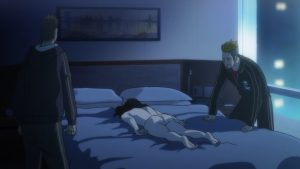 In most respects Fall 2017 constitutes a pretty average anime season. It’s neither exceptionally good or exceptionally bad, it offers a respectable number of good series and no true masterpieces. But it’s highly unusual for me in one sense – pretty much since the second week, it’s been lacking in bubble series. I pretty much knew what I was covering and what I was dropping, and only two shows – Kujira no Kora and Inuyashiki – might realistically have been called question marks.
In most respects Fall 2017 constitutes a pretty average anime season. It’s neither exceptionally good or exceptionally bad, it offers a respectable number of good series and no true masterpieces. But it’s highly unusual for me in one sense – pretty much since the second week, it’s been lacking in bubble series. I pretty much knew what I was covering and what I was dropping, and only two shows – Kujira no Kora and Inuyashiki – might realistically have been called question marks.
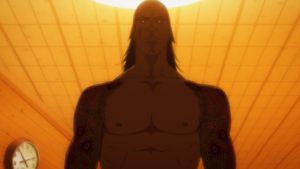 Inuyashiki itself is an odd sort of bubble show, too, in that I’m ambivalent and non-ambivalent about it at the same time. Frankly it’s one of the most entertaining series of the year, and consistently too – this ep felt like it was over in about 10 minutes. But even as I’m wrapped up in Inuyashiki I’m aware that I’m being manipulated by it. That’s not a deal-breaker by any means, but it does make me feel sort of unsettled. This is a show that takes the easy path to reaching the audience, to making them feel – but so far at least it is reaching me.
Inuyashiki itself is an odd sort of bubble show, too, in that I’m ambivalent and non-ambivalent about it at the same time. Frankly it’s one of the most entertaining series of the year, and consistently too – this ep felt like it was over in about 10 minutes. But even as I’m wrapped up in Inuyashiki I’m aware that I’m being manipulated by it. That’s not a deal-breaker by any means, but it does make me feel sort of unsettled. This is a show that takes the easy path to reaching the audience, to making them feel – but so far at least it is reaching me.
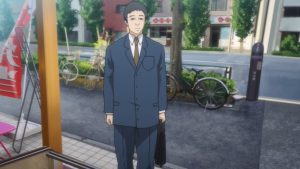 This week’s plot throws everything but the kitchen sink at you – craven yakuza, forced blowjobs in the sauna, young lovers being torn apart, kidnapping and attempted rape and murder. It’s quite the package, pretty ludicrous if we’re honest. but one can’t help but feel a certain pity for the young couple targeted by the yakuza for reasons. There certainly are yakuza in Japan (the sight of tattoos in public baths is pretty much a universal code) but truthfully, they tend to avoid messing with civilians for no reason and in return, the authorities mostly leave them be. But hey – it makes for good drama.
This week’s plot throws everything but the kitchen sink at you – craven yakuza, forced blowjobs in the sauna, young lovers being torn apart, kidnapping and attempted rape and murder. It’s quite the package, pretty ludicrous if we’re honest. but one can’t help but feel a certain pity for the young couple targeted by the yakuza for reasons. There certainly are yakuza in Japan (the sight of tattoos in public baths is pretty much a universal code) but truthfully, they tend to avoid messing with civilians for no reason and in return, the authorities mostly leave them be. But hey – it makes for good drama.
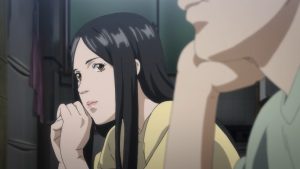 There was never a question that Ichirou-san was going to get involved in all this, and clearly this episode was more about changing the way we see his character than about the couple or their yakuza tormentor (Kuroda Takaya). Inuyashiki-san is undeniably kind and compassionate, but woefully unprepared to be the avenger for good he seems intent on being. He seems not to grasp the potential consequences of his interventions, and doesn’t appear to have much of a plan beyond “wait for the screams, then go help”. I mean it’s nice that he’s doing it, and it sure beats using your finger to kill entire families in their homes. But I can’t really see it ending well unless Ichirou changes his approach.
There was never a question that Ichirou-san was going to get involved in all this, and clearly this episode was more about changing the way we see his character than about the couple or their yakuza tormentor (Kuroda Takaya). Inuyashiki-san is undeniably kind and compassionate, but woefully unprepared to be the avenger for good he seems intent on being. He seems not to grasp the potential consequences of his interventions, and doesn’t appear to have much of a plan beyond “wait for the screams, then go help”. I mean it’s nice that he’s doing it, and it sure beats using your finger to kill entire families in their homes. But I can’t really see it ending well unless Ichirou changes his approach.
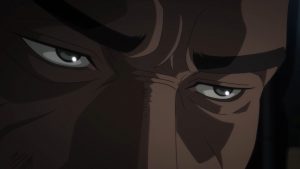 In these yakuza, Ichirou is dealing with something different than teen thugs in the park or the element of fire. There’s no compromising with these men, no scaring them off – they take what they want and if you get in their way, they kill you. Once again the question of where the human ends and the machine begins is very much central to all this. Is it Inuyashiki who blinds and paralyzes all those men, or is it whatever non-human thing he’s become? Whichever the answer, Ichirou-san seems to have learned one truth – he can’t accomplish what he wants without becoming some version of what he hates. There’s a thin line between superhero and vigilante (Boku no Hero Academia of course explores this, and in subtler fashion). No one could deny that he was right to try and help that couple, but once Inuyashiki starts down this path, where does it end? And that’s certainly not a question he’s capable of answering at this point in the story.
In these yakuza, Ichirou is dealing with something different than teen thugs in the park or the element of fire. There’s no compromising with these men, no scaring them off – they take what they want and if you get in their way, they kill you. Once again the question of where the human ends and the machine begins is very much central to all this. Is it Inuyashiki who blinds and paralyzes all those men, or is it whatever non-human thing he’s become? Whichever the answer, Ichirou-san seems to have learned one truth – he can’t accomplish what he wants without becoming some version of what he hates. There’s a thin line between superhero and vigilante (Boku no Hero Academia of course explores this, and in subtler fashion). No one could deny that he was right to try and help that couple, but once Inuyashiki starts down this path, where does it end? And that’s certainly not a question he’s capable of answering at this point in the story.


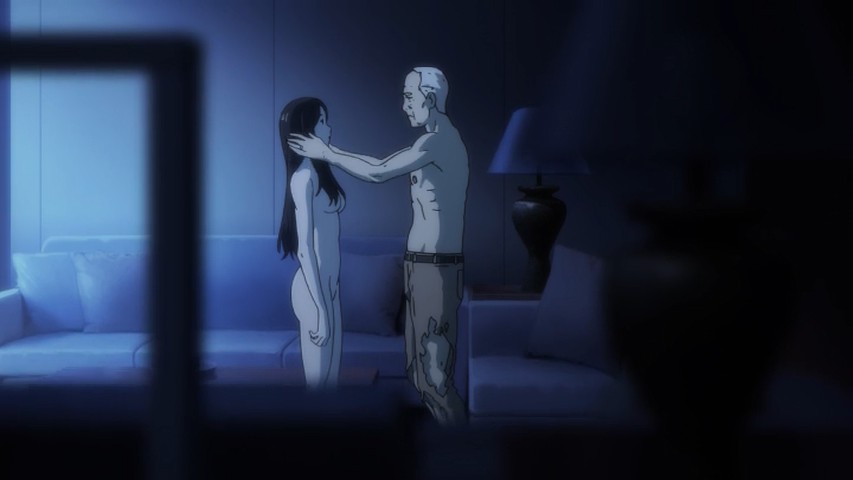
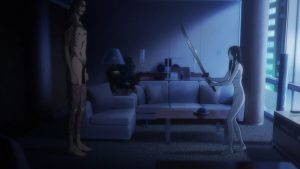
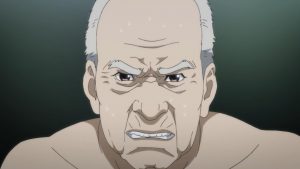
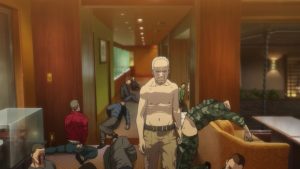
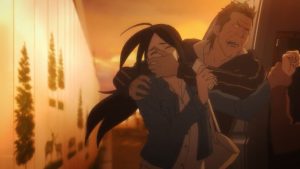
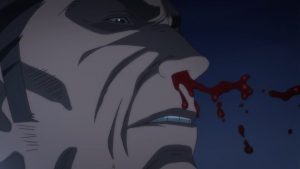
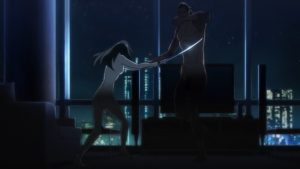
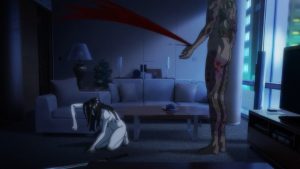
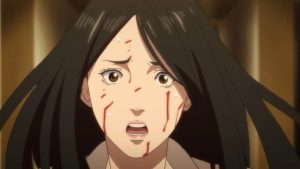
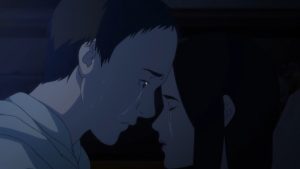
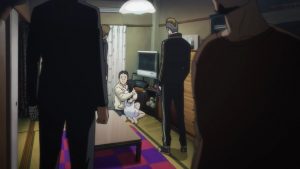
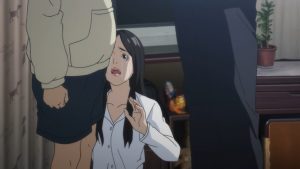
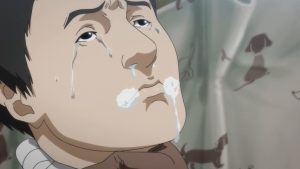
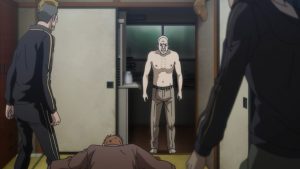
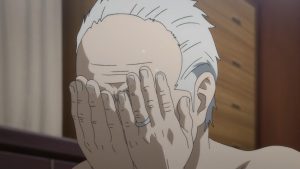
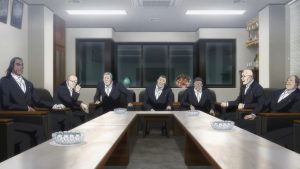
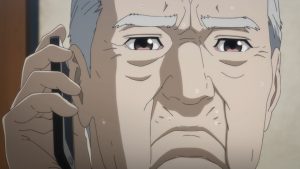
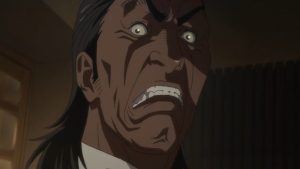
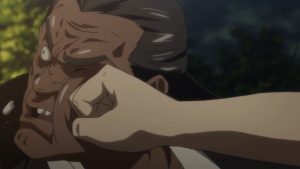
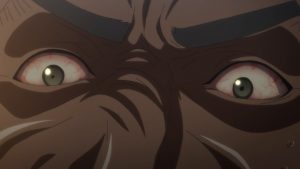
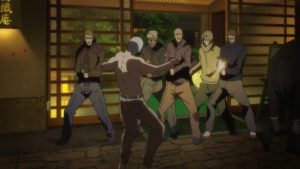
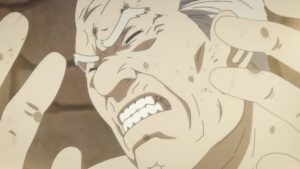
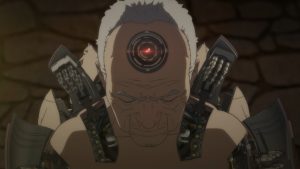
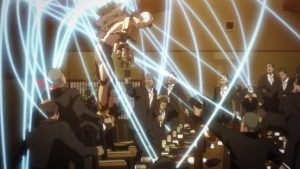
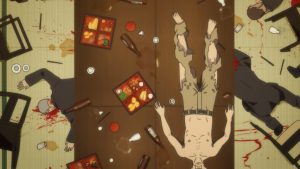
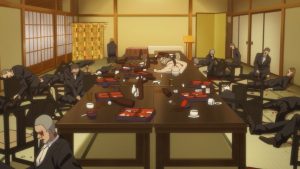
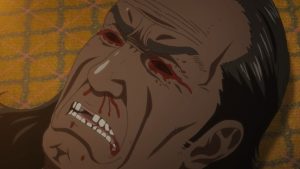
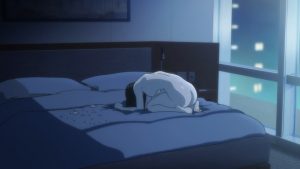
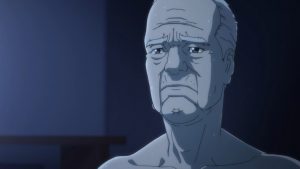
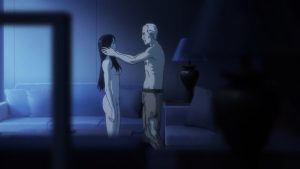

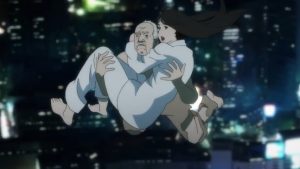
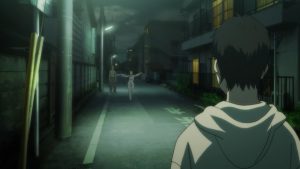
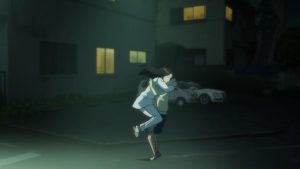


DP
November 3, 2017 at 2:34 amTo me, this show answers the question:
What if Death Note had been hateful, exploitive trash? If it wasn’t so shot through with misanthropy, I might even find some of the more poorly written and absurd scenes campily funny. Instead, I’m just sort of hate watching it…
Simone
November 3, 2017 at 2:56 amI’m not sure why this sort of exploitative, over the top stuff gets labeled as being “misanthropic”. I don’t see it. Misanthropic would be hating the human race as a whole. This is just a world of extremes. The good people are Really Good; the bad people are Really Bad. If one were misanthropic one wouldn’t feel for the plight of the two separated lovers (really, this was basically a modern Japanese rendition of that Italian XIX century foundational novel, “The bethroted”), or feel sympathy for Inuyashiki himself. I think this episode if anything made him a bit too much of a “badass avenger” type. This is the man who cried with joy after saving a run-over cat, and at the thought of being able to heal more people.
Sometimes it seems like some people assume that it’s an obligatory trait of a good person to be idealistic and starry eyed and believe in the fundamentally good nature of mankind. That as soon as you start doubting that, and reflect it in your writing, you’re becoming yourself an active cause of evil in the world. I think that’s a pretty naive view. Yeah, believing too much in human predatory nature can become a self-fulfilling prophecy, but it’s also ridiculous to think that without books or movies or anime telling us that we can be evil no one would have the idea that yeah, maybe that one thing they want? They can just snatch it by force, and fuck everyone else. I’d also add, being optimistic or pessimistic, idealistic or cynical, is also a character trait. I’m a pessimist and self-help pseudo-philosophical snippets make me grumble in pain but I still try to be as good as possible in my daily life. I don’t think everyone is neither inherently good nor inherently bad. I think the context makes the person, and so I try to do my best not to make that context worse.
Guardian Enzo
November 3, 2017 at 8:01 amFor the most part I think I agree with you here – Inuyashiki is trashy and basically pulp, but I don’t think it’s really misanthropic (maybe pessimistic). If anything it seems to me to have a misogynistic streak but I haven’t fully made up my mind about that yet.
Simone
November 3, 2017 at 10:21 amAs a manga reader I didn’t have the impression that there was a distinct demeaning of women (the same way it happens for example in Death Note where they’re all stupid and/or easily manipulated). They’re just not much into the spotlight because this is a story about two men, mostly, so they usually appear either as victims to be rescued (not that Inuyashiki doesn’t rescue men as well) or other sorts of supporting characters. There’s a couple relevant female characters that appear in the OP but haven’t yet featured in the show itself. It’s possible that the story is somewhat sexist in the sense that it relegates more or less purposefully women to this supporting, relatively passive role, but I think that would not hold as much meaning if not for the fact that we tend to look at anime as a whole and see this pattern again and again.
Simone
November 3, 2017 at 10:22 am(and I would add – compared to Gantz where all female characters only existed for the purpose of randomly getting naked with alarming regularity, that’s progress)